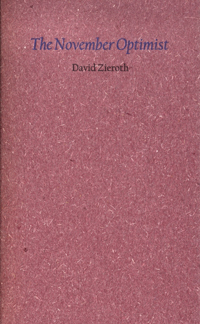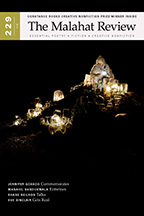Reviews
Poetry Review by Doug Beardsley
David Zieroth, The November Optimist (Kentville: Gaspereau, 2013). Paperbound, 98 pp., $24.95.
The French have a word for it—flâneur. In many countries it defines someone who is an idler, a dawdler, or loafer. But in France—and particularly in Paris—it refers to a person who is a stroller, one who ambles through a city, one who is in touch with the tradition, history, and spirit of place. He or she is often an opinionated soul who provides context, through gossip and background, by offering glimpses of the human drama unfolding on city streets. In this poetic novella, David Zieroth’s narrator is a flâneur. His territory is North Vancouver, in particular the area around Lonsdale Quay just off the Sea Bus station. He describes the daily incidents of ordinary life with a delicately laced language akin to a spider’s web.
Epiphanies. A lover’s language. Spirit of place. The flâneur’s philosophy is to “simply enjoy the walk into the future without dragging along every second of the present as it turns into the past.” But how to bring together the fragments of ordinary conversation that make up life’s small connections? When he began writingSons and Lovers, D. H. Lawrence complained of the difficulties he encountered in writing of ordinary people going about their everyday lives, though our own recent Nobel Laureate, Alice Munro, seems to have had little problem in discovering the extraordinary in so-called “normal” lives. How do we, as characters in this human drama, begin to speak, to say something, to open to the possibilities? As readers, how are we to respond? As a reviewer, how does one capture the fleeting, tenuous connections of the spider’s web?
A café, the voice-over of the protagonist (it’s amazing what too much coffee will do to you). Another man reading an unnamed Penguin classic: “Try to catch the cover” (permit readers to name it, permit them to think of those iconic covers). Durrell’s Alexandria Quartet perhaps? The Second Narrows Bridge (a crib mattress tipping off a van like a white raft). At a sunny playground. How would you react to the baby? Third Street. Where a child mischievously grabs a man’s thigh in front of an astonished father. A near-deaf garage mechanic. A Mosquito Creek detail. Everything observed. Noted. Examined. Turned over. Turned upside down. Into art. How to contain all this? The storyteller as container. Love, a container. The white goddess. An invisible muse continually referred to. Even if the woman is invisible, veiled, ever so slightly surreal. Is she a conjured memory or imagined? “The worlds we have when we have love that we can’t have when we have only ourselves.” What are we to make of this technical device? Experience or imagination? Either way, it demands to be shared. The need. The reader not enough. The longing for the unattainable. Six degrees of separation. How to be taken out of ourselves. The writer as “book-bearing go-between.” We walk on. The city as character. The reader too becomes a character in this potpourri, this literary medley, this dream reverie. The cinema on Esplanade. The natural world overwhelmed by “warmongers and warriors.” So much wrong in this world. North Van, the city’s “transformation from town to towers” as one looks back. Lonsdale Avenue, “a trough to funnel logs…down to the ships.” The Lonsdale 239 going up. At the rear with the intelligentsia. “The city rising beyond its blue harbour.” The tall, lame woman. Street hockey, shinny with dad and daughter. Bits of real life. “The thin, old lady…a spindly shorebird.” A burnt-out beam of what we might become? The detail of the Moleskine notebook. The radar of writing. Characters as “perforated pull-offs.” The red awning at Bean’s. An IGA. Self-doubt creeps in: “Maybe I can’t see what I’m looking for.” The movie set at Grapes and First. The German neighbour. Angelina’s Café.
Zieroth’s most compassionate writing concerns a beggar named Daniel. This seven-page song in the middle of The November Optimist is deeply-felt, outstandingly perceptive, and is the highlight of the novella. “Life might just be as it seems.” There is the occasional soft observation—“but the strength in his crouching haunches shows he’s ready as any to make the world he wants”—but, for the most part, the author steers clear of such “earth-warm delight,” of the best-of-all-possible-worlds school. Most often, he feels a “strength of soul” in the people he encounters on his civilized civic walks in “the light of common day,” as Wordsworth put it. We become “city-sauntered…civic companions.” The November Optimist ends in a dream escape to Venice, while never leaving “the pages’ dream” we’ve been given. Such a gift.
—Doug Beardsley









